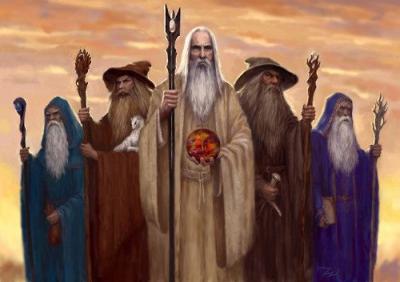| LotR TCG Wiki | → Card Sets: | All | 0 | 1 | 2 | 3 | 4 | 5 | 6 | 7 | 8 | 9 | 10 | 11 | 12 | 13 | 14 | 15 | 16 | 17 | 18 | 19 | → Forums: | TLHH | CC |
The Lord of the Rings TCG Wiki: Wizard
Wizard
About 1600 years before the events of The Lord of the Rings, the Valar gods in Valinor grew troubled at Sauron's growth in power and worried that the Free Peoples of Middle-earth would be unable to stop him unaided. To this end the Valar sent a group of the Maiar under their command to oppose and ultimately throw down Sauron from his dark throne.
Those selected were Curumo, sent by Aulë the Smith, and Alatar, sent by Oromë the huntsman. These two were not deemed enough, and Manwë, chief of the Valar, sought out Olórin to aid them. Olórin at first refused, claiming he was weak and expressing fear of Sauron, but at this he was rebuked and told that this was all the more reason to resist him. Yavanna, keeper of the woods, then requested Curumo that he take Aiwendil as a companion, as Aiwendil was like unto her in his lore and love of all living things. Alatar then chose Pallando as a friend.
These Five were commanded to resist Sauron through uprising; to incite courage and steadfastness in the peoples of Middle-earth and were forbidden to fight Power with Power. They took the forms of old men, though as Maiar they were immortal and seemed to have incredible stamina and longevity to the ignorant watcher. As they mingled with the Free Peoples of Middle-earth, they took the names given them rather than reveal their own: Curumo was called by Men Saruman; Aiwendil was called Radagast; Olórin was named Gandalf, and Alatar and Pallando passed into the East and were never named by the Men of Gondor.
In The Lord of the Rings TCG, Wizard is the Race given to these five Istari. Gandalf and the traitor Saruman are the most prominent and powerful, successfully emboldening the forces around them to oppose their enemies. See the Gandalf Culture and Isengard Culture for more information on strategy and use. Radagast the Brown and his Staff have been represented as limited-edition Gandalf Culture cards; and Followers representing the distant influence of the two Blue Wizards Alatar and Pallando are also present.
There are a handful of cards which are set apart in that they may regularly interact with both Free Peoples and Shadow wizards. While it is rare that the Free Peoples would need to spot a Shadow Wizard rather than Gandalf or Radagast, the Shadow player can use this to his or her advantage when matched up against the Gandalf Culture. These cards are Perspective, Alatar Deceived, Pallando Deceived, Radagast Deceived, Staff of Saruman, Fallen Istar's Stave, and Throne of Isengard.
It is interesting to note that a generic Wizard's Staff possession has been printed a few times as a Gandalf Culture card with the very particular requirement of “Bearer must be a Wizard”, rather than “Bearer must be Gandalf”. It could be surmised that there was to be some card or strategy in place that would allow Shadow players using Saruman to “steal” such a Staff from the Free Peoples Gandalf, and so weaken him. This was never directly implemented, though Strange-looking Men (banned or restricted in all formats) is capable of transferring Wizard's Staff to Saruman.
Cards with the Race of Wizard
Free Peoples
 Gandalf, The Grey Wizard
Gandalf, The Grey Wizard Gandalf, The Grey Pilgrim
Gandalf, The Grey Pilgrim Gandalf, Greyhame
Gandalf, Greyhame Gandalf, The White Wizard
Gandalf, The White Wizard Gandalf, Mithrandir
Gandalf, Mithrandir Gandalf, Defender of the West
Gandalf, Defender of the West Gandalf, Manager of Wizards
Gandalf, Manager of Wizards Gandalf, Leader of Men
Gandalf, Leader of Men Gandalf, Leader of the Company
Gandalf, Leader of the Company Gandalf, The White Rider
Gandalf, The White Rider Gandalf, Bearer of Obligation
Gandalf, Bearer of Obligation Gandalf, Powerful Guide
Gandalf, Powerful Guide Gandalf, Returned
Gandalf, Returned Gandalf, Wise Guide
Gandalf, Wise Guide Gandalf, Stormcrow
Gandalf, Stormcrow Radagast, The Brown
Radagast, The Brown
Shadow
 Saruman, Keeper of Isengard
Saruman, Keeper of Isengard Saruman, Servant of the Eye
Saruman, Servant of the Eye Saruman, Rabble-rouser
Saruman, Rabble-rouser Saruman, Black Traitor
Saruman, Black Traitor Saruman, Master of Foul Folk
Saruman, Master of Foul Folk Saruman, Of Many Colours
Saruman, Of Many Colours Saruman, Agent of the Dark Lord
Saruman, Agent of the Dark Lord Saruman, Instigator of Insurrection
Saruman, Instigator of Insurrection Saruman, Coldly Still
Saruman, Coldly Still Saruman, Curunir
Saruman, Curunir Saruman, Master of the White Hand
Saruman, Master of the White Hand Alatar Deceived
Alatar Deceived Pallando Deceived
Pallando Deceived Radagast Deceived
Radagast Deceived
Cards which Interact with the Wizards
While many cards call out Gandalf and Saruman by name, these cards interact with any Wizard or with either of the  Wizards. Free Peoples cards are overwhelmingly from the Gandalf Culture while Shadow cards mostly come from the Isengard Culture, with exceptions noted.
Wizards. Free Peoples cards are overwhelmingly from the Gandalf Culture while Shadow cards mostly come from the Isengard Culture, with exceptions noted.
| Race | |||||||||||||
|---|---|---|---|---|---|---|---|---|---|---|---|---|---|
| Shadow | Balrog | Creature | Half-Troll | Maia | Nazgûl | Orc | Spider | Troll | Uruk-hai | Man | Wizard | Wraith | [Raceless] |
| Free Peoples | Dwarf | Elf | Ent | Hobbit | Tree | ||||||||


